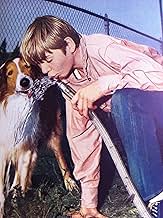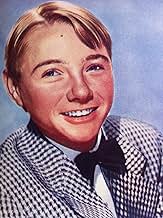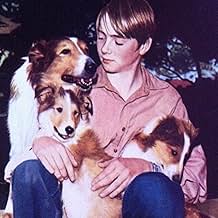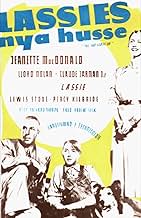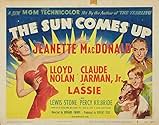Set in the rural south of the United States, a bereaved war widow learns to to put aside her bitterness and grief as she grows to love a young orphan boy and the dog that belonged to her lat... Read allSet in the rural south of the United States, a bereaved war widow learns to to put aside her bitterness and grief as she grows to love a young orphan boy and the dog that belonged to her late son. Punctuated with song-filled interludes.Set in the rural south of the United States, a bereaved war widow learns to to put aside her bitterness and grief as she grows to love a young orphan boy and the dog that belonged to her late son. Punctuated with song-filled interludes.
Ed Agresti
- Musician
- (uncredited)
Jessie Arnold
- Townswoman at Fire
- (uncredited)
Charles Bates
- Orphan
- (uncredited)
Bobby Beyers
- Orphan
- (uncredited)
Barbara Billingsley
- Nurse
- (uncredited)
Paul E. Burns
- Dr. Sample
- (uncredited)
John Butler
- Hotel Attendant
- (uncredited)
Featured reviews
Yes, I know.
I'd never seen it - it was MacDonald's last film - what better way for MGM to say you are a has- been than to make her a "mother" in a Lassie movie. Drek! I prepared to "endure it" for Jeannette's sake.
I was utterly captivated. What a lovely movie - classed up there with Friendly Persuasion in terms of truly loving, and truly honest human emotion. I keep trying to convince myself to pass this along, but I cry too much, it's too real, too human, too GOOD for that. For the lovers of what President Wilson tried to do for the US and what Obama in his footsteps is still unable to do for us, this is what the ideal of the US is as it lives on in ideals, honesty, and right thinking and feeling.
Jeannette has four classical aria/song moments - a French song, a repetition of Puccini's Un Bel Di (Broadway Serenade), Songs My Mother Taught Me, and Romance. Not much to go on, but it doesn't matter. She is fine dramatically, as a war widow , whose son dies and is left alone, but is brought to life by her encounter with an orphan {exceptional performance by young actor, Claude Jarman, Jr.] Her son exits at 10 minutes into the film, young Jarman arrives at 20 minutes.
Lewis Stone is seen briefly as an adviser. Percy Kilbridge is brilliant in a Charles Butterworth role as the local sage. Margaret Hamilton is unforgettable as a fashion-conscious spinster. Poor Lloyd Nolan doesn't arrive until an hour and 3 minutes in, but we know he will anchor the film, as he always did {most successfully in Peyton Place).
Oh, do see it - that dog will melt you as will the story and the deft acting, direction and over-all good intentions of it.
I'd never seen it - it was MacDonald's last film - what better way for MGM to say you are a has- been than to make her a "mother" in a Lassie movie. Drek! I prepared to "endure it" for Jeannette's sake.
I was utterly captivated. What a lovely movie - classed up there with Friendly Persuasion in terms of truly loving, and truly honest human emotion. I keep trying to convince myself to pass this along, but I cry too much, it's too real, too human, too GOOD for that. For the lovers of what President Wilson tried to do for the US and what Obama in his footsteps is still unable to do for us, this is what the ideal of the US is as it lives on in ideals, honesty, and right thinking and feeling.
Jeannette has four classical aria/song moments - a French song, a repetition of Puccini's Un Bel Di (Broadway Serenade), Songs My Mother Taught Me, and Romance. Not much to go on, but it doesn't matter. She is fine dramatically, as a war widow , whose son dies and is left alone, but is brought to life by her encounter with an orphan {exceptional performance by young actor, Claude Jarman, Jr.] Her son exits at 10 minutes into the film, young Jarman arrives at 20 minutes.
Lewis Stone is seen briefly as an adviser. Percy Kilbridge is brilliant in a Charles Butterworth role as the local sage. Margaret Hamilton is unforgettable as a fashion-conscious spinster. Poor Lloyd Nolan doesn't arrive until an hour and 3 minutes in, but we know he will anchor the film, as he always did {most successfully in Peyton Place).
Oh, do see it - that dog will melt you as will the story and the deft acting, direction and over-all good intentions of it.
This is a movie that may be a bit corny by modern measure but a wonderful film to sit down with a young child and watch. Old time values--a slice of life with real problems---a happy ending.
Though she didn't intend The Sun Comes Up to be her final film, it turned out that way for Jeanette MacDonald. In this movie she plays, what else, a concert singer who is a war widow. After a few years of devoting herself to raising her only son, Dwayne Hickman, MacDonald is encouraged by her manager Lewis Stone to go back to the concert stage.
She goes back and becomes a great success in her comeback. But after the concert she sees her son run down by a truck as he was trying to save their collie Lassie from the same fate.
That just about destroys her and who could blame her for wanting to get away from it all. She rents an unused house deep in the Appalachians in North Carolina that's owned by Lloyd Nolan. She and Lassie go to live there and get involved with a group of kids from the county orphanage. Especially one young man, Claude Jarman, Jr., who reminds her of her late son.
Jeanette gets some good opera and concert material to sing, items that were staples in her real concerts. The highlights for me are Un Bel Di from Madame Butterfly and Romance.
And she gets her most cooperative co-star ever in Lassie. The beloved collie pulls off quite a rescue in the climax, but didn't steal any scenes from Jeanette MacDonald.
She never planned that The Sun Comes Up would be her last film. She had a lot of ambitions to return to the screen. During the Fifties she did The King and I in summer stock and hoped to be cast in the film adaption as Anna Leonowens. I think the part would have suited her perfectly and she wouldn't have to have been dubbed as Deborah Kerr was.
And one part she really wanted was as the Mother Abbess in The Sound of Music. She loved the song Climb Every Mountain. But by the time the film version of Sound of Music was being cast, Jeanette's health was failing.
Still The Sun Comes Up is a fine family film and a fitting end for a screen legend.
She goes back and becomes a great success in her comeback. But after the concert she sees her son run down by a truck as he was trying to save their collie Lassie from the same fate.
That just about destroys her and who could blame her for wanting to get away from it all. She rents an unused house deep in the Appalachians in North Carolina that's owned by Lloyd Nolan. She and Lassie go to live there and get involved with a group of kids from the county orphanage. Especially one young man, Claude Jarman, Jr., who reminds her of her late son.
Jeanette gets some good opera and concert material to sing, items that were staples in her real concerts. The highlights for me are Un Bel Di from Madame Butterfly and Romance.
And she gets her most cooperative co-star ever in Lassie. The beloved collie pulls off quite a rescue in the climax, but didn't steal any scenes from Jeanette MacDonald.
She never planned that The Sun Comes Up would be her last film. She had a lot of ambitions to return to the screen. During the Fifties she did The King and I in summer stock and hoped to be cast in the film adaption as Anna Leonowens. I think the part would have suited her perfectly and she wouldn't have to have been dubbed as Deborah Kerr was.
And one part she really wanted was as the Mother Abbess in The Sound of Music. She loved the song Climb Every Mountain. But by the time the film version of Sound of Music was being cast, Jeanette's health was failing.
Still The Sun Comes Up is a fine family film and a fitting end for a screen legend.
Jeannette MacDonald (as Helen Lorfield Winter) is an opera singer making a comeback, after three years of mourning for her deceased husband. She is devoted to her son, and he is devoted to his dog, Lassie. After a successful comeback concert, Ms. MacDonald's son is killed in a horrific accident; he is hit by a truck while running for Lassie. MacDonald is understandably devastated. Initially, she blames Lassie for contributing to her son's death, but MacDonald is able to forgive Lassie, and she comes to care for the dog as her son would have wished. Pained by the sound of children playing, MacDonald takes Lassie, and moves to the country, where she hopes to enjoy a life of solitude. Then, she and Lassie meet young Claude Jarman Jr. (as Jerry), from a neighboring orphanage
The sentimental storyline in "The Sun Comes Up" is most predictable; but, it hardly matters, as the film does what it does well. First of all, this (the fifth in the original series) is the best "Lassie" since the 1943 original. Richard Thorpe is an unexpected success, seamlessly directing a seemingly difficult mix of children, seasoned professionals, and Lassie. In her last feature film, Jeannette MacDonald could not have been more capable; certainly, she ends her movie career on a high note. Jarman Jr., of "The Yearling" is a well-chosen Lassie co-star. Lassie performs expertly. André Previn provides an appropriately swell score. The film ends with a well-done fiery rescue.
When the film threatens to become too predictable, or sentimental, you can enjoy delightful supporting pros, like: Lewis Stone (an MGM classic), Percy Kilbride ("Pa Kettle"), and Margaret Hamilton (Oz' Wicked Witch). Tarzan's "boy" Johnny Sheffield appears (to have hanged up his loincloth). Other kids making impressions are: Dwayne Hickman ("Dobie Gillis") as "Hank", Teddy Infuhr (also from the "Ma and Pa Kettle" series) as "Junebug", and Michael McGuire (who'll possess the "Dark Shadows" cast in 1970) as "Cleaver".
******* The Sun Comes Up (1/27/49)) Richard Thorpe ~ Jeanette MacDonald, Claude Jarman Jr., Lloyd Nolan, Lassie
The sentimental storyline in "The Sun Comes Up" is most predictable; but, it hardly matters, as the film does what it does well. First of all, this (the fifth in the original series) is the best "Lassie" since the 1943 original. Richard Thorpe is an unexpected success, seamlessly directing a seemingly difficult mix of children, seasoned professionals, and Lassie. In her last feature film, Jeannette MacDonald could not have been more capable; certainly, she ends her movie career on a high note. Jarman Jr., of "The Yearling" is a well-chosen Lassie co-star. Lassie performs expertly. André Previn provides an appropriately swell score. The film ends with a well-done fiery rescue.
When the film threatens to become too predictable, or sentimental, you can enjoy delightful supporting pros, like: Lewis Stone (an MGM classic), Percy Kilbride ("Pa Kettle"), and Margaret Hamilton (Oz' Wicked Witch). Tarzan's "boy" Johnny Sheffield appears (to have hanged up his loincloth). Other kids making impressions are: Dwayne Hickman ("Dobie Gillis") as "Hank", Teddy Infuhr (also from the "Ma and Pa Kettle" series) as "Junebug", and Michael McGuire (who'll possess the "Dark Shadows" cast in 1970) as "Cleaver".
******* The Sun Comes Up (1/27/49)) Richard Thorpe ~ Jeanette MacDonald, Claude Jarman Jr., Lloyd Nolan, Lassie
Even if you don't like Jeanette McDonald, and even if you don't like child actors, and even if you don't like Lassie, do yourself a favor and rent The Sun Comes Up just to listen to the main theme during the opening credits. André Previn earned a well-deserved Rag nomination for his first film composition. It's such a beautiful, layered theme that sounds exactly as it's supposed to. It sounds like a sunrise, the promise of a brighter future, and a deep inhalation after years of shallow breathing.
If you want to watch more than the opening credits, you'll get to see Jeanette McDonald in a drama where she barely sings. She starts the movie off as a successful performer, but when her young son is accidentally killed, she tells her manager, Lewis Stone, that she's going to retire and retreat into the country. She packs up her car and her grief and drives to a small mountain town where she can hopefully start over. What she doesn't yet realize is that in a small town, no one leaves you alone! The owner of the one general store, Percy Kilbride, is extremely nosy, a confusing Margaret Hamilton wants to be her friend, and the young errand boy, Claude Jarman Jr., who grows attached to her dog doesn't let her harden her heart as she'd intended.
I didn't really know what to expect out of this movie, but it was pretty enjoyable. My favorite scene was when Jeanette leaves for the countryside. She's left her son's dog, Lassie, behind because it would be too painful to continue to live with her and show her affection; her son was hit by a car while trying to get Lassie out of the middle of the road. But Lassie's lonely and confused too, and it might be some sort of comfort to love who her son loved. Jeanette's very conflicted, and it's a really powerful scene.
I kept waiting for Lloyd Nolan to show up, since he got such a high billing, but he's hardly in the movie. Instead of a romance where a mother can only move on from her tragedy by falling in love, Jeanette grows in other ways. Give this one a shot if it sounds interesting. It gets a bit corny in some parts, but keep in mind it is a Lassie movie. It's supposed to be a little corny.
If you want to watch more than the opening credits, you'll get to see Jeanette McDonald in a drama where she barely sings. She starts the movie off as a successful performer, but when her young son is accidentally killed, she tells her manager, Lewis Stone, that she's going to retire and retreat into the country. She packs up her car and her grief and drives to a small mountain town where she can hopefully start over. What she doesn't yet realize is that in a small town, no one leaves you alone! The owner of the one general store, Percy Kilbride, is extremely nosy, a confusing Margaret Hamilton wants to be her friend, and the young errand boy, Claude Jarman Jr., who grows attached to her dog doesn't let her harden her heart as she'd intended.
I didn't really know what to expect out of this movie, but it was pretty enjoyable. My favorite scene was when Jeanette leaves for the countryside. She's left her son's dog, Lassie, behind because it would be too painful to continue to live with her and show her affection; her son was hit by a car while trying to get Lassie out of the middle of the road. But Lassie's lonely and confused too, and it might be some sort of comfort to love who her son loved. Jeanette's very conflicted, and it's a really powerful scene.
I kept waiting for Lloyd Nolan to show up, since he got such a high billing, but he's hardly in the movie. Instead of a romance where a mother can only move on from her tragedy by falling in love, Jeanette grows in other ways. Give this one a shot if it sounds interesting. It gets a bit corny in some parts, but keep in mind it is a Lassie movie. It's supposed to be a little corny.
Did you know
- TriviaThe Sun Comes Up (1949) is mainly based on the 1936 short story "A Mother in Mannville" by Marjorie Kinnan Rawlings. According to the University of South Carolina Libraries description of Rawlings' works, in 1946 MGM asked Rawlings to do a story that could star Lassie with Claude Jarman Jr.. Rawlings started with her 1936 short story "A Mother in Mannville." MGM bought the rights to Rawlings' unpublished story "A Family for Jock," re-titled it "Mountain Prelude," and sold the literary rights to The Saturday Evening Post. The story appeared The Post as a six-part serial during April 26 to May 31, 1947. But it has never been published in novel form.
- GoofsWhen Jerry finally decides to go play with Lassie, we can hear someone off-screen give Lassie a command. Right after Jerry says,"Let's have fun now," and hugs Lassie, a man's voice clearly speaks a word off-camera, and Lassie looks in that direction before running off with the boy.
- SoundtracksUn Bel Di
(uncredited)
from "Madama Butterfly"
Music by Giacomo Puccini
Libretto by Luigi Illica and Giuseppe Giacosa
Sung by Jeanette MacDonald
Details
- Release date
- Country of origin
- Language
- Also known as
- Prolećno sunce
- Filming locations
- Production company
- See more company credits at IMDbPro
- Runtime
- 1h 33m(93 min)
- Aspect ratio
- 1.37 : 1
Contribute to this page
Suggest an edit or add missing content


